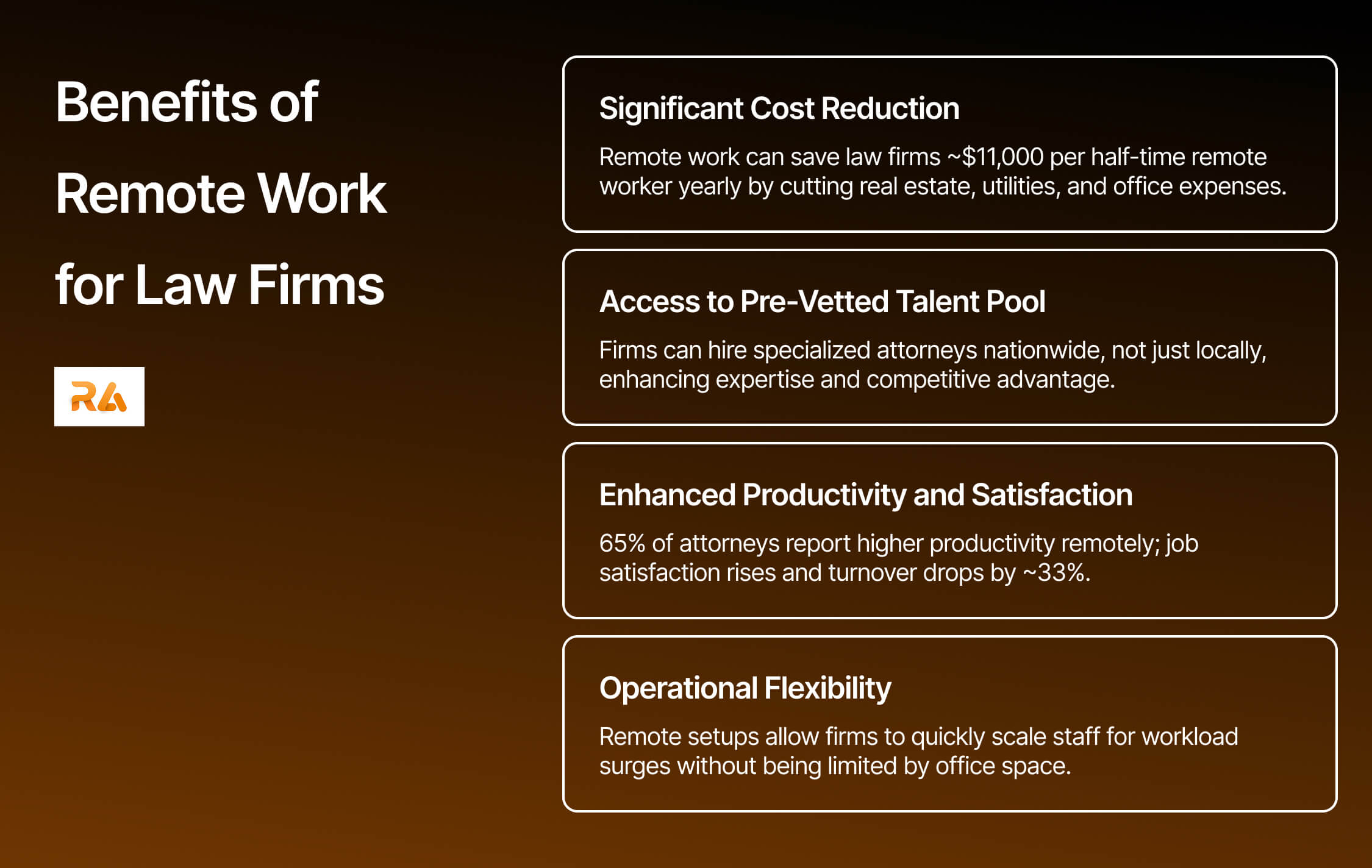The legal industry has undergone a dramatic transformation in how attorneys approach their work environment. According to recent industry data, 87% of law firms now provide remote work options for their lawyers, while 68% of major firms have adopted a four-day office attendance model.
But if you're a law firm leader, you're not just looking at statistics—you're weighing a critical business decision. Can you really maintain quality, security, and profitability with a remote team?
This guide examines the effectiveness of remote work arrangements in legal practice, backed by industry data and real-world outcomes.
What is a Remote Legal Work for Law Firms
Remote legal work refers to an operational model in which legal professionals perform their duties outside traditional law office environments. This arrangement can take several forms:
- Fully Remote: Team members work from different locations 100% of the time.
- Hybrid Model: A mix of in-office and remote days for flexibility.
- Flexible Arrangements: Attorneys work remotely as needed for client meetings, focus work, or personal commitments.
Remote legal work is supported by cloud-based legal technology, secure communication platforms, and virtual collaboration tools to maintain productivity. This model removes geographic limitations while upholding high service standards.
Benefits of Remote Legal Work for Law Firms

Understanding the advantages of remote work arrangements helps clarify why so many law firms have embraced this model beyond the initial pandemic necessity.
Significant Cost Reduction
Law firms implementing remote work setups experience substantial financial benefits. Based on industry research, employers can save an average of $11,000 per half-time remote worker annually. These savings stem from reduced real estate costs, lower utility expenses, and decreased spending on office supplies and amenities. For firms struggling with high overhead costs, remote work arrangements provide immediate relief to profit margins without sacrificing service quality.
Access to Pre-Vetted Talent Pool
Remote work arrangements significantly expand hiring capabilities for law firms. Rather than limiting recruitment to local geographic areas, firms can access a nationwide pool of legal-trained professionals with U.S. law experience. This expanded talent pool allows firms to hire specialized attorneys in niche practice areas who may not be available locally, improving the firm's competitive positioning and service offerings.
Enhanced Productivity and Satisfaction
Contrary to initial concerns, data demonstrates that remote work improves rather than hinders legal work. According to industry surveys, 65% of attorneys report increased productivity in remote or hybrid models. Furthermore, remote work improved job satisfaction and reduced turnover by one-third, with particularly significant benefits for attorneys with long commutes or caregiving responsibilities. In fact, only 4% of small law firms identified remote work as a significant operational challenge, indicating that productivity concerns are largely unfounded.
Operational Flexibility
Law firms with remote work capabilities can scale their operations more efficiently. When workload increases, firms can quickly onboard legal-trained professionals to handle surge capacity without the delays associated with office space constraints. This flexibility proves particularly valuable for firms handling seasonal work fluctuations or managing unexpected client demands.
Challenges of Remote Legal Work
While remote legal work offers substantial benefits, law firms must address several challenges to ensure successful implementation.
Technology and Security Requirements
Law firms handle sensitive client information subject to strict confidentiality requirements. Remote work arrangements require robust cybersecurity measures, secure cloud-based platforms, and proper data encryption to protect privileged communications. Firms must invest in legal-specific technology solutions and provide comprehensive training to ensure all remote staff understand security protocols.
Communication and Collaboration
Traditional office environments facilitate spontaneous collaboration and mentorship opportunities through in-person interactions. Remote work arrangements require intentional communication strategies to replicate these benefits. Firms must establish clear communication protocols, regular check-ins, and structured collaboration processes to maintain team cohesion and support professional development.
Client Expectations
Some clients prefer in-person meetings and may initially question the professionalism of remote legal services. Law firms must proactively communicate the benefits of their remote work model while offering flexibility for clients who prefer face-to-face interactions when necessary.
Work-Life Boundary Management
Remote work can blur the boundaries between professional and personal life, potentially leading to burnout. Law firms must establish clear expectations around availability, response times, and work hours to help attorneys maintain healthy boundaries while working remotely.
How Remote Attorneys Can Help Your Law Firm Scale
Many law firms find that hiring remote attorneys specifically trained for virtual work environments provides an optimal solution to scaling challenges. Remote attorney services offer several distinct advantages:
- Specialized Legal Expertise, Anywhere. Firms can access attorneys with specific practice area experience regardless of location, filling capability gaps that may not exist locally.
- Built-in Workflow Management. Professional remote attorney platforms provide built-in management tools, time tracking, and performance monitoring that streamline supervision and ensure accountability.
- Flexible, Cost-Effective Engagement. Remote attorneys can be engaged on project-based, part-time, or full-time arrangements, allowing firms to adjust capacity based on actual workload rather than maintaining excess fixed costs.
- Reduced Administrative Burden. According to industry data, 77% of small law firms report spending excessive time on administrative tasks. Remote attorney platforms handle many administrative functions, allowing firm leaders to focus on legal work and client relationships rather than HR management.

Does Remote Legal Work Actually Work for Law Firms?
The short answer is yes. Remote legal work has moved far beyond a temporary trend to become a proven model for running a modern law firm. The most successful firms are not just allowing work-from-home days; they are strategically building flexible, efficient practices that attract top talent and serve clients effectively.
Success comes down to your approach. Firms that see the best results treat remote work as a strategic upgrade, not just a location change. This means investing in the right technology and communication tools from the start.
The key is to stop trying to replicate the old office environment online and instead build new, smarter workflows. Many forward-thinking firms achieve this by partnering with professional remote legal platforms.
These services provide direct access to U.S. law-experienced attorneys who are trained for virtual collaboration. They handle the vetting and management, allowing you to focus entirely on your practice.
This shift is why the most pressing question for attorneys is no longer if remote work works for law firms, but how to implement it most effectively. The focus is now on building a structured model that maximizes these proven benefits while maintaining the highest standards of quality and client service.
Scale Your Law Firm with Remote Legal Professionals
Remote Attorneys provides access to a pre-vetted talent pool of U.S. law-experienced legal professionals, all backed by comprehensive platform technology. We help you build a scalable, efficient team that reduces cost and drives growth for your law firm.
Book a demo to discover how remote attorneys can transform your firm's capacity and profitability.
Frequently Asked Questions
Can remote attorneys handle complex legal work?
Yes. Remote attorneys undergo rigorous vetting and training processes to ensure they can handle sophisticated legal work. Many have years of experience in specific practice areas and are supervised by U.S.-based attorneys. With proper technology platforms and communication protocols, remote attorneys deliver the same quality work as in-office staff.
How do law firms maintain confidentiality with remote work?
Law firms maintain confidentiality through secure cloud-based platforms, encrypted communication channels, and comprehensive security protocols. Professional remote attorney platforms include built-in security features designed specifically for legal work, often exceeding the security measures of traditional office environments.


.webp)

.webp)